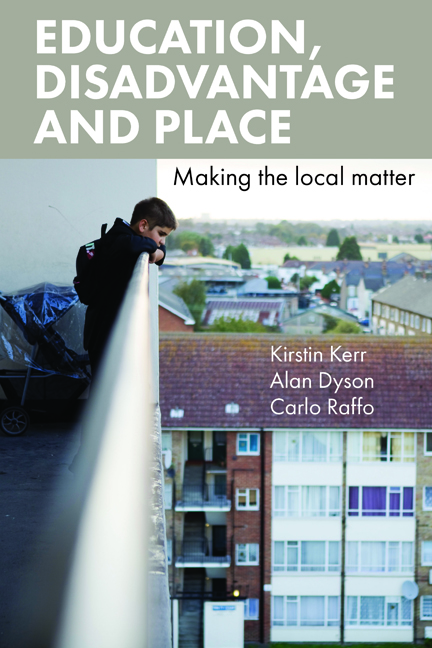Book contents
- Frontmatter
- Contents
- List of tables and figures
- Notes on authors
- Acknowledgements
- one Introduction
- two Why place matters in education
- three Local education systems as products of place: a case study
- four Learning from the past
- five Learning from the present
- six A rationale for a new generation of area-based initiatives
- seven Developing understandings of place as a basis for intervention
- eight Evaluation and monitoring
- nine Governance and accountability
- ten Children and places in hard times: some concluding thoughts
- References
- Index
six - A rationale for a new generation of area-based initiatives
Published online by Cambridge University Press: 25 February 2022
- Frontmatter
- Contents
- List of tables and figures
- Notes on authors
- Acknowledgements
- one Introduction
- two Why place matters in education
- three Local education systems as products of place: a case study
- four Learning from the past
- five Learning from the present
- six A rationale for a new generation of area-based initiatives
- seven Developing understandings of place as a basis for intervention
- eight Evaluation and monitoring
- nine Governance and accountability
- ten Children and places in hard times: some concluding thoughts
- References
- Index
Summary
So far, we have seen that area-based initiatives (ABIs), and particularly education-focused ABIs, have a distinctly mixed track record. Perhaps, at best, they can claim a modest degree of success in ameliorating conditions and improving outcomes, to some extent, for some people, in some places. This has led some critics to argue that ABIs are not an appropriate vehicle for tackling disadvantage, and that their time is over. However, we have also seen that this is not the whole story. Modest improvements are undoubtedly better than nothing – and perhaps even life-changing for some. Furthermore, ABIs have not remained static, but have evolved, and we have sought to distinguish between:
• first-generation, nationally mandated stand-alone ABIs, separate from mainstream programmes, with discrete funding and targeted at specific urban areas;
• second-generation, nationally mandated embedded ABIs, where separate initiatives have been embedded within mainstream programmes to create universally progressive provision with the capacity to respond to spatial concentrations of disadvantage; and
• newly emerging, locally developed ABIs, where groups of local stakeholders are beginning to act to develop their own area-based strategies to tackle a range of interconnected issues, drawing on national policies to support their aims where possible.
In Chapter Five, we looked in detail at two newly emerging, locally developed ABIs. While neither was without its problems, we, nonetheless, saw how they seemed to offer ways forward that promised to overcome some of the well-known difficulties with previous generations of nationally mandated ABIs.
Our purpose in this chapter is to stand back from the detail of these examples to examine the principles that underpin them. In doing so, our aim is to develop a rationale for action that is considerably more robust than the common-sense assumption that additional resources will be enough to overcome the problems of disadvantaged places. In our discussion, we will draw particularly on an ecological approach to understanding place – as initially explored in Chapters One and Two. We will also revisit the issue of the purposes ABIs might serve, and in addressing this, will introduce notions of ‘risk’, ‘protection’ and ‘resilience’. We begin, however, by revisiting one of this book's underlying themes, namely, what it is that ABIs can realistically be expected to achieve.
What can be changed?
Any new rationale for ABIs as interventions in the relationships between education, disadvantage and place depends upon establishing that those relationships can, in fact, be changed.
- Type
- Chapter
- Information
- Education, Disadvantage and PlaceMaking the Local Matter, pp. 109 - 130Publisher: Bristol University PressPrint publication year: 2014



